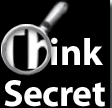January 05, 2005
Apple vs. Think Secret: Trade Secret Disclosure Steals Macworld Thunder
 Apple decided itís had enough of fan sites blowing the cover on its product development initiatives and decided to sue one of them to get them to stop disclosing trade secrets:
Apple decided itís had enough of fan sites blowing the cover on its product development initiatives and decided to sue one of them to get them to stop disclosing trade secrets:
-
Apple Computer Inc. filed another lawsuit in the Superior Court of Santa Clara County on Tuesday against a Web site alleged to have posted proprietary information or trade secrets.
This follows a filing in December by Apple, of Cupertino, Calif., which asked the court to subpoena sites in order to reveal the identities of individuals who allegedly placed such information on message boards related to similar sites.
This later suit differs from the December one in that it is not seeking to reveal the identity of anonymous or pseudonymous posters, but rather is claiming damages from articles filed and published by the owners of the site ThinkSecret.com.
In Apple's claim, it says recent Think Secret articles contained trade secrets.
In the past week, Think Secret has published articles claiming to reveal an upcoming Apple productivity suite, named iWork, as well as a sub-$500 Macintosh desktop computer.
Apple's action was based on the Uniform Trade Secrets Act as defined in California Civil Code 3426.1. This states that if a company takes reasonable measures to protect its information and the information derives value from being kept secret, California courts should rule that such information, even if it is commonplace, should be afforded protection as a trade secret. Common examples of such data are corporate minutes and customer lists.
Under this statute, misappropriation, which is defined as the acquisition of information via improper means or the use or disclosure of trade secrets, is prosecutable.
"Trade secret cases are fairly common," said Kurt Opsahl, a staff attorney for the Electronic Frontier Foundation, a nonprofit group interested in protecting digital rights.
Opsahl noted that there might be a jurisdictional issue in the case as Apple filed under the California Uniform Trade Secrets Act (most states have their own version of the statute), while the company that owns the ThinkSecret Web site is based in New York. However, Opsahl said, this is a minor issue and one Apple says is moot.
He said he thought Apple's suit was ill-advised since it is essential that a news organization be able to maintain confidentiality of sources.
"[ThinkSecret] may not have the same physical characteristics as a newspaper, but there is no way to make a strong distinction between these and online sites," Opsahl said. "To deny a site like that the status of a news operation is inappropriate."
In the December suit, Apple asked for subpoenas against Think Secret in order to discover the true identity of a poster on the AppleNova message boards.
However, despite a link to the latter on the former's front page, there is no business or editorial connection between the two.
In past years, Apple has sent cease-and-desist letters to many Web sites that have purported to have inside information on upcoming Apple products.
Such rumors have traditionally ramped up as the company's annual trade show Macworld approached. Many Mac watchers have noted that such furor, even when fueled by threatened legal actions by Apple, has only served to increase the marketing buzz around the company and its products.
The next such conference is scheduled to begin Jan. 10 in San Francisco. Parts of the city have already been covered with posters for the company's popular iPod MP3 player.
Whether Apple can stop the rumor-mongering or not, the disadvantage of having rabid fans as customers means they're so starved for news, it creates demand for the sort of secret-swapping Think Secret is all about.
- Arik
Posted by Arik Johnson at January 5, 2005 01:57 PM | TrackBack "Competitive Intelligence applies the lessons of competition and principles of intelligence to the need for every business to gain awareness and predictability of market risk and opportunity. By doing so, CI has the power to transform an enterprise from also-ran into a real winner, with agility enough to create and maintain sustainable competitive advantage."
"Competitive Intelligence applies the lessons of competition and principles of intelligence to the need for every business to gain awareness and predictability of market risk and opportunity. By doing so, CI has the power to transform an enterprise from also-ran into a real winner, with agility enough to create and maintain sustainable competitive advantage."
